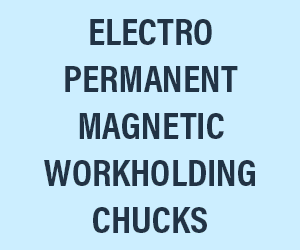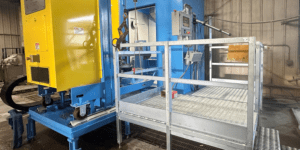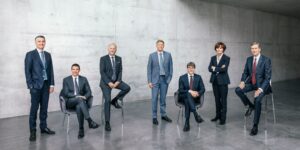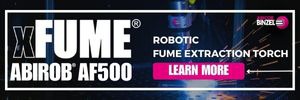METAL FABRICATION TRIPLE THREAT
Mini ERP: Midland Metal Products, a Chicago manufacturer of retail displays, overtakes global competitors by using automated laser-cutting, forming and material handling systems from Cincinnati Incorporated that can churn out 35 prototypes per week, all while meeting daily JIT production schedules.
Posted: December 30, 2011
Mini ERP: This Chicago manufacturer of retail displays overtakes global competitors by using automated laser-cutting, forming and material handling systems that can churn out 35 prototypes per week, all while meeting daily JIT production schedules.
How does a family-owned manufacturer of in-store retail displays compete on the global level from its single operation inside an urban city? For Midland Metal Products (Chicago, IL) the answer is simple – give customers unbeatable quality and delivery using integrated, automated laser cutting, material handling and forming systems from Cincinnati Incorporated (Cincinnati, OH).
In 2003, Midland Metal stood at the proverbial crossroads of needing to decide whether it would continue to serve the point-of-purchase (POP) display needs of national retail outlets and, if so, how to do it more competitively. The McDonald family – father Bernie, mother Suzanne, and sons Marcus and B.J. – made the decision not only to continue, but to expand and evolve by employing automation in its metal fabrication operation.
“As CEO, my responsibility is to be a steward of this firm to ensure its continuation and success for future generations,” says Suzanne, the granddaughter of the company founder. This stewardship drives the plant’s commitment to re-invest profits into automation and positions Midland Metal as a leader in its field. Its commitment to automation is invested in the integration of two Cincinnati laser cutting systems with an automated material handling system and four Cincinnati press brakes.
It is rare for a family-owned business to reach its fourth generation of management. “As the old saying goes, the first generation builds the business, the second generation makes it a success and the third wrecks it,” jokes Marcus. But Midland Metal is far from any scrap heap. Its commitment to the future is illustrated by its investment in advanced machine tools.
This year marks its 90th year in business, and the company is taking what it has learned serving major retailers and is looking to expand into additional markets where high-quality fabrications and can-do attitude are valued. McDonald added, “Our equipment and processes are allowing us to approach other metal fabrication markets, and that’s something we could not have done seven or eight years ago.”
The company’s relationship with Cincinnati has now developed to the point of serving as a Chicago-based showroom for their equipment. “They have customer prospects come through our shop about once a month to see the lasers and press brakes in action,” smiles Marcus. “We can show them just about anything Cincinnati offers – lasers, press brakes, material handling and the software that runs it all.”
These systems cut lead times from eight weeks to as little as three as the operation became much leaner. They enable the plant to produce full-size, functioning prototypes rapidly, a core capability and competitive advantage for working in a production schedule that averaged 35 prototypes a week in 2010. “The retail world is as fast-paced as it comes,” notes Marcus McDonald, a co-owner of the company. “Our CNC machines run with Scheduler software that keeps us in step with our customers so we can deliver high-quality fixtures within tight timeframes.”
This plant understands the value of U.S.-based manufacturing in the current business climate, from both the customer and service provider perspectives. “We discovered a significant market for domestically produced fabrications,” explains Marcus. “We understand how our customers use price, quality and delivery time to make their purchase decisions. So while it remains hard to compete with offshore prices, our team and equipment still wins contracts often based on quality and delivery.”
TRIPLE THREAT FABRICATION
Founded in 1923 as a wire shop, Midland Metal now occupies a 110,000 sq ft facility near U.S. Cellular Field and has expanded to become a rare “triple threat” in metal fabrication – specializing in wire, sheet metal and tube fabrication.
This is no small feat. It took a significant investment in machinery and tooling – and a willingness to embrace automation – to get this operation where it is today. “Having been in business back then for 85 years, we had accumulated a stable of 20 punch presses that were constantly being set up or repaired. Downtime was significant, and our turnaround time was anywhere from six to eight weeks, depending on the project,” recalls co-owner B.J. McDonald. “We were determined to get our delivery time down to three to four weeks to be competitive in the industry. We started looking at ways to do this. Our first piece of CNC equipment was a turret press.”
That investment led to the purchase of the plant’s first laser cutting system in 2005, a Cincinnati 3.5 kW CL-707 that changed their entire approach to manufacturing. “When we acquired the laser, we began looking at lean manufacturing models and things like 5S (set, sort, shine, standardize and sustain) and the Rule of Adjacency,” adds B.J. “We re-arranged our shop floor to maximize the laser’s impact on our operational efficiency.”
The rest, as the saying goes, is history. Now automation is the theme in many other areas of the factory as well, with the plant deploying CNC wire formers, CNC robots, CNC mesh welders and a CNC tube laser. Acquiring that first laser also led to a better appreciation of well-built machines and responsive customer service. “Our operation went from using 20 punch presses to relying on a single laser cutting system, so we needed ultimate reliability,” smiles B.J. “Without back-up equipment, service and support became a huge factor because downtime is death.”
For this reason, Midland Metal appreciates close supplier proximity and quick response when machine maintenance or repair is required. “Service and support have been keys to our ability to meet tight deadlines,” says Marcus. “If we need a machine part, it’s here in a day. With foreign-made machines, it may take weeks to get a single part delivered. We simply cannot afford to be down that long.”
The company further expanded its metal forming capabilities by adding a 60 ton Autoform+ press brake, a 90 ton Proform press brake, and two CBII model press brakes that received control upgrades. All four press brakes use Touchscreen PC controls. The Autoform and Proform press brakes each feature programmable ram speeds that can maximize forming speed for fast throughput of the small parts common to display racks and fixtures. The Autoform uses Dynamic Thickness Compensation to improve angular consistency by measuring and automatically compensating for material thickness variations during production runs. The Proform uses a Quick Clamp modular bolt-on ram nose with hardened, sectionalized tools.
The backbone of this fully automated shop was put in place later in 2010 with the addition of a CL-840 4 kW laser cutting system and an extension to the existing modular material handling system (MMHS). The CL-840 is ideal for the high throughput, all-around material versatility and cutting precision demanded by Midland Metal’s high-volume, quick-turn operations. “Retailers react to consumer trends and their desire is to get newly approved fixtures in their stores as soon as possible. The fabricator that can turn a project around the fastest, while still meeting the quality and design standards, is going to get the business,” states B.J. “Earning and keeping business is what this technology and automation have allowed us to do.”
The CL-840 also expanded the range of materials being used in fabrication. “Before the 840, we could cut up to 14 ga mild steel using shop air. But now we are cutting our full range of materials, from 11 ga to 22 ga mild steel and even some wood, still using only shop air,” notes B.J.
The MMHS serves both lasers by feeding 6 ft x 12 ft (2 m x 4 m) sheets in material thicknesses ranging from 22 ga (.76 mm) to .5 in (13 mm). This adds to shop productivity by allowing the plant to optimize its staff size. “Automation enables us to do more with a leaner, more focused staff,” says Marcus. “We find that machine operators who embrace automation are able to take on more responsibility. This allows us to work leaner, while still increasing our productivity. Our team finds many small ways to be more efficient. For example, we don’t use all of the drawer slots on the MMHS tower, so one of our operators discovered that if we pull out one of the upper drawers, the feeder doesn’t go all the way to the top before starting back down. It may save a just a few seconds at a time, but that adds up over the course of the day.”
To maximize the efficiency of its CNC machines and ensure it meets just-in-time (JIT) delivery requirements, Midland Metal conceptualized and convinced Cincinnati to develop the Scheduler software, the module of the software suite used to control the laser cutting systems and press brakes. Scheduler takes information entered by the programmer and automatically nests parts for optimum material usage and job turnaround. It also tracks material inventory and provides a production schedule that can meet delivery dates.
“This software makes order out of chaos,” smiles Marcus. “It’s really like a mini ERP system because it gives us the ability to accommodate last-minute design changes or increases in order quantities – common occurrences with our retail customers. We also use Scheduler as a customer relations tool because we can accurately determine when orders will be delivered based on its information and communicate that to our customers for their planning purposes.”
The compatibility of these lasers and press brakes with Solidworks makes it possible for orders to be received and manufacturing of the parts to begin on the same day. The software makes prototyping easy, which is critical for a shop that produced more than 1800 prototype designs last year. “We build full-size, fully functioning prototypes. The interface between Solidworks and the laser cutting systems and press brakes is the key to our ability to show the customer exactly what will end up in stores,” explains Marcus. “The interface enables us to receive a design file, send the flat files to a laser, send the formed files to a press brake and have a prototype done in the same day.”
The quality and ease of use of this equipment have enabled Midland Metal to build a reputation of providing parts and fixtures of impeccable quality, all delivered on-time. “Our products are viewed as ‘premium’ in the market. Our customers expect excellent quality and on-time delivery,” adds Marcus. “That is a reputation that our automated equipment helped create. Now it allows us to maintain that reputation and continue to grow our business.”
Midland Metal Products, 1200 West 37th Street, Chicago, IL 60609, 773-927-5700, 773-927-1456, www.midlandmetalproducts.com.
Cincinnati Incorporated, Box 11111, Cincinnati, OH 45211, 513-367-7100, Fax: 513-367-7552, [email protected], www.e-ci.com.














